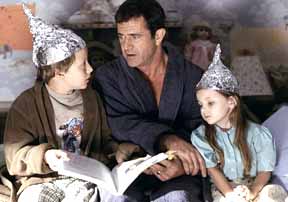There is little doubt that still-young filmmaker Night Shyamalan has skills not just as an astute filmmaker and director (particularly of children) but primarily as a storyteller. As his previous two successes, The Sixth Sense and Unbreakable, indicate, he unspools a yarn at a measured pace, fully utilising the film medium to pace information and build suspense, pulling the audience along with him like a magician until with a dramatic wave of his cape, he unveils what has actually been happening all along.
Though his "surprise" endings have become a bit of a trademark, the resolution of his latest film, Signs, actually turns out to be the film's undoing so deftly does he build the suspense that the conclusion just can't satisfy our heightened expectations.
As with his previous films, Signs begins with a mystery: crop circles appear in the corn fields of an ex-minister (Mel Gibson), freaking out his two children (the absolutely fabulous Rory Culkin and Bo Hess) and former minor league ball-playing brother (Joaquin Phoenix). Much speculation of their origins occurs until they begin to appear world-wide and it turns out that they are, in fact, alien in nature.
Where Shyamalan succeeds is in the intimacy of the story he wants to tell surrounding this makeshift family. Of particular importance is the theme of faith: Gibson quit his ministry after the death of his wife in a car accident; the loss of Phoenix's confidence since his failure as a baseball player; and the desire of the children to explore and believe in a world as vivid as their imaginations. Within the film itself, it's a convincing thread Gibson's search for a "higher being" coincides with proof that there is life off the planet but the notion that religious faith can be equated with simple belief, in anything at all, is suspect.
Shyamalan is a spectacular craftsman, utilising all his well-earned lessons from his two greatest sources: Alfred Hitchcock and Steven Spielberg. Instead of splurging millions of dollars on extra-terrestrial special effects, he keeps his camera close to the family's rural home; rather than expand his tale in ambitious extra character studies, he stays with the family's point of view, making their fear and paranoia and hope seem all the more poignant. Here more than ever, he's a master at what not to show, letting a fallen flashlight illuminate a dusty basement floor while sound designers work their insidious fingers into the imagination of the audience.
Such built up tensions deserve a worthwhile conclusion, something Shyamalan has now delivered twice. But without giving too much away, Signs lacks the initial punch the film requires, and then erodes all that has come before it in the minutes after the credits roll. It's disappointing simply because he's shown such deft skill at creating fascinating, watchable work that stands up to repeat viewings and analysis; this time, his wrap-up just doesn't hold water.
Though his "surprise" endings have become a bit of a trademark, the resolution of his latest film, Signs, actually turns out to be the film's undoing so deftly does he build the suspense that the conclusion just can't satisfy our heightened expectations.
As with his previous films, Signs begins with a mystery: crop circles appear in the corn fields of an ex-minister (Mel Gibson), freaking out his two children (the absolutely fabulous Rory Culkin and Bo Hess) and former minor league ball-playing brother (Joaquin Phoenix). Much speculation of their origins occurs until they begin to appear world-wide and it turns out that they are, in fact, alien in nature.
Where Shyamalan succeeds is in the intimacy of the story he wants to tell surrounding this makeshift family. Of particular importance is the theme of faith: Gibson quit his ministry after the death of his wife in a car accident; the loss of Phoenix's confidence since his failure as a baseball player; and the desire of the children to explore and believe in a world as vivid as their imaginations. Within the film itself, it's a convincing thread Gibson's search for a "higher being" coincides with proof that there is life off the planet but the notion that religious faith can be equated with simple belief, in anything at all, is suspect.
Shyamalan is a spectacular craftsman, utilising all his well-earned lessons from his two greatest sources: Alfred Hitchcock and Steven Spielberg. Instead of splurging millions of dollars on extra-terrestrial special effects, he keeps his camera close to the family's rural home; rather than expand his tale in ambitious extra character studies, he stays with the family's point of view, making their fear and paranoia and hope seem all the more poignant. Here more than ever, he's a master at what not to show, letting a fallen flashlight illuminate a dusty basement floor while sound designers work their insidious fingers into the imagination of the audience.
Such built up tensions deserve a worthwhile conclusion, something Shyamalan has now delivered twice. But without giving too much away, Signs lacks the initial punch the film requires, and then erodes all that has come before it in the minutes after the credits roll. It's disappointing simply because he's shown such deft skill at creating fascinating, watchable work that stands up to repeat viewings and analysis; this time, his wrap-up just doesn't hold water.
